This report is a collection of stories, case studies and statistics that demonstrate what CCT has achieved this year.
It covers the impact of all components of the CCT’s Village Hive model, including the Satellite Youth Centres, Medical Outreach, Family Finance, Construction, Foster Care, Reintegration and Family Strengthening. It also highlights some key initiatives that fall outside the standard Village Hive model, such as the Kammakor Village Slum Transformation Project and the ICT Public School Education Program.
The support from CCT’s donors has enabled thousands of vulnerable children to access life-changing services and programs. It has transformed whole villages into safe havens in which all vulnerable children are protected.
Children Prevented From Being Separated From Their Families
Villages With Access To Cct Family Strengthening Support And Services
People With Access To Cct Family Strengthening Support And Services
CCT’s Village Hive plugs gaps in vital support services. A network of services, including health, education, home construction, financial coaching, and foster care, ensure families have the resources to raise their children, preventing unnecessary family separation.
Many of the services in CCT’s Village Hive model are delivered from Youth Centres.
Working together with families to solve complex problems can take time. While CCT social workers are helping families work towards their long-term goals, vulnerable children are able to access their basic needs from the Youth Centre in their village.
Watch the video to see some of the services that are delivered out of the Youth Centres.
Nutritious Meals Served To Vulnerable Children
Vulnerable Children Prevented From Ending Up On The Streets
Vulnerable Children Who Advanced To Next Grade At Public School
New Vulnerable Children Enrolled In Public School
3-year-old Mali lives with her mother, Sovatey, in a small, one-room house. Sovatey works every day collecting recyclable materials that she can sell on, but it was becoming more of a challenge to keep Mali safe, as she needed to take her growing toddler with her while she worked.
Since enrolling Mali in the Youth Centre Preschool, Sovatey has found it easier to make ends meet and no longer worries about her daughter’s safety. Mali accesses her basic needs through CCT’s preschool program 6 days a week.
In November, CCT enrolled Mali into public preschool, which she’ll attend in addition to the Youth Centre. Enrolling in public preschool will make sure Mali has a good start to her educational journey. CCT provided her with a school uniform, bags and shoes and will ensure she arrives to preschool safely each day.
Extra Class Provided, Allowing Disadvantaged Children To Catch Up To Their Peers And Stay On Track With Their Education
Vulnerable Children Under 5 Years Receiving Early Childhood Services
Public School Classes Allowing Disadvantaged Children To Catch Up To Their Peers And Stay On Track With Their Education
Vulnerable Children Who Stayed Enrolled In Public School
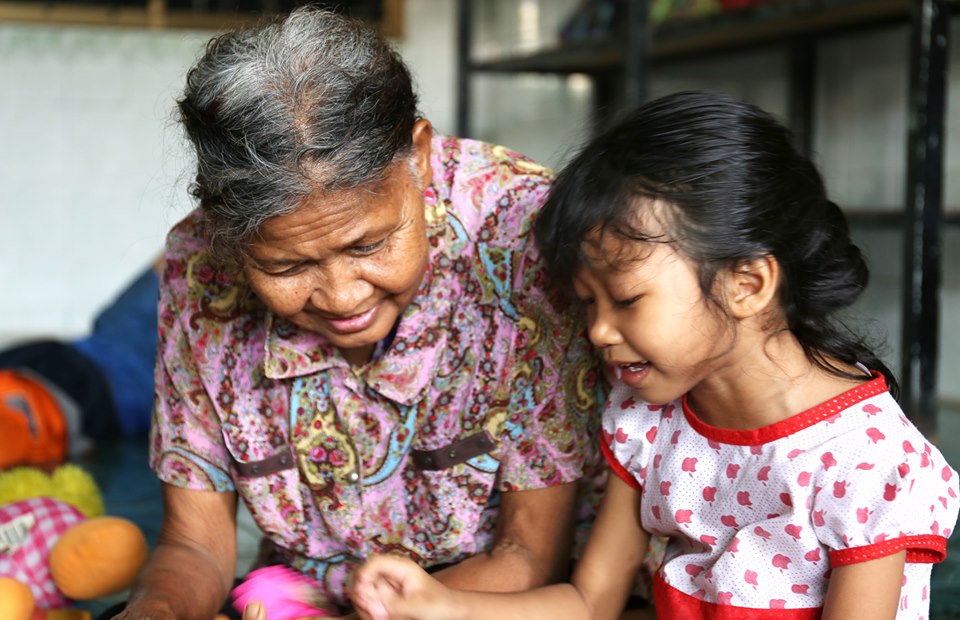
6-year-old Chakriya started attending the Youth Centre Preschool a year ago. During her year in CCT’s programs, Chakriya did not speak to her teachers or other children.
Earlier this year, the Youth Centre team engaged a speech therapist to assist with complex cases, such as Chakriya’s. After some observation and play sessions, we decided to see if strategies for supporting children with selective mutism could be helpful for Chakriya. Her teachers, her grandma, and her social worker all came together to devise a plan to encourage Chakriya to speak. Within just 3 hours of starting the speech therapist’s technique, Chakriya spoke for the first time ever at the centre!
A few months later and Chakriya has gained a new level of confidence. She’s now comfortable engaging and playing with other children, and has made lots of new friends. Her teachers a the Youth Centre have been excited to learn how chatty, loud and assertive she really is.
After witnessing her development over the past couple of months, Chakriya’s social worker and teachers met with Grandma to discuss her leaving preschool and starting Grade 1. They were all in agreement that the confidence she had built at the centre over the past couple of months had prepared her to leave preschool and start primary school. CCT social workers and teachers are working together with Grandma to support Chakriya and will be behind her every step of the way.
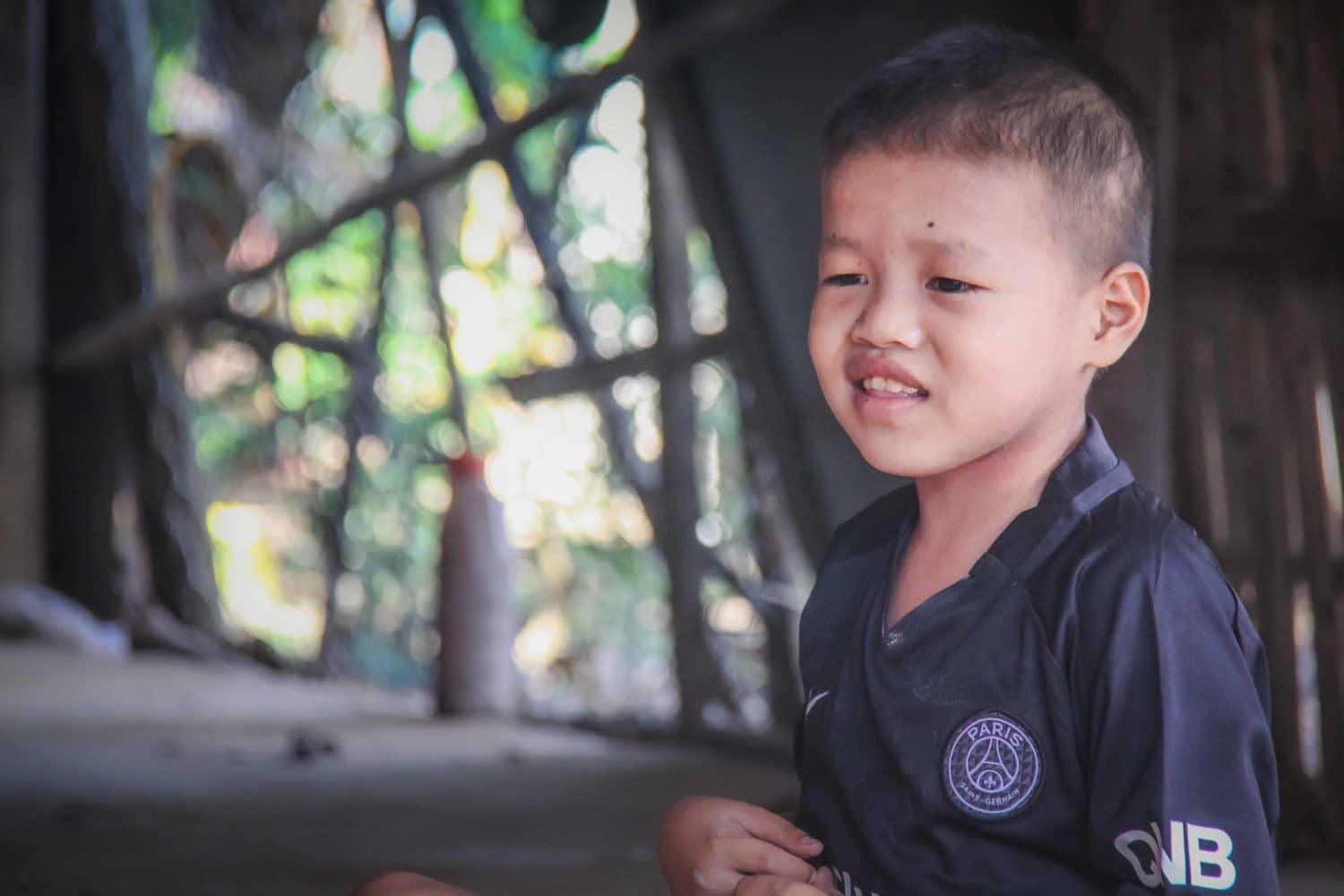
Earlier this year, CCT’s Reintegration Team helped Vuthy, 11, leave an orphanage in Battambang. He had been separated from his mother because he has a disability and his mother was struggling to care for him.
CCT helped Vuthy leave the orphanage to live temporarily with a foster care family who can tend to his needs. He has experienced severe neglect and malnutrition, so CCT social workers are working closely with Vuthy’s foster care family, to help them provide the love and support he has been without for so long.
After living with his foster care family for just 3 weeks, Vuthy built up enough strength to enrol in the Youth Centre. When Vuthy started at the centre, he spent all his time alone, not interacting with any teachers or students. He didn’t like noise, played only with straws, and couldn’t eat or drink without assistance. Four months later and Vuthy has made some incredible progress. He’s now comfortable playing and interacting with the staff and has a couple of children who he spends his time with. He loves dancing, listening to music and plays with all different kinds of toys.
CCT’s Medical Outreach team work with closely Vuthy at the centre, providing him with extra support that focuses on his nutrition and physiotherapy. He has gained weight and gotten stronger, which means he can now feed himself and drink without help from CCT staff. CCT will continue to support Vuthy’s development at the Youth Centre and will work with his mother, building necessary supports around her, including providing her with counselling, parenting skills and vocational training so that she and Ruthy can be reunited.
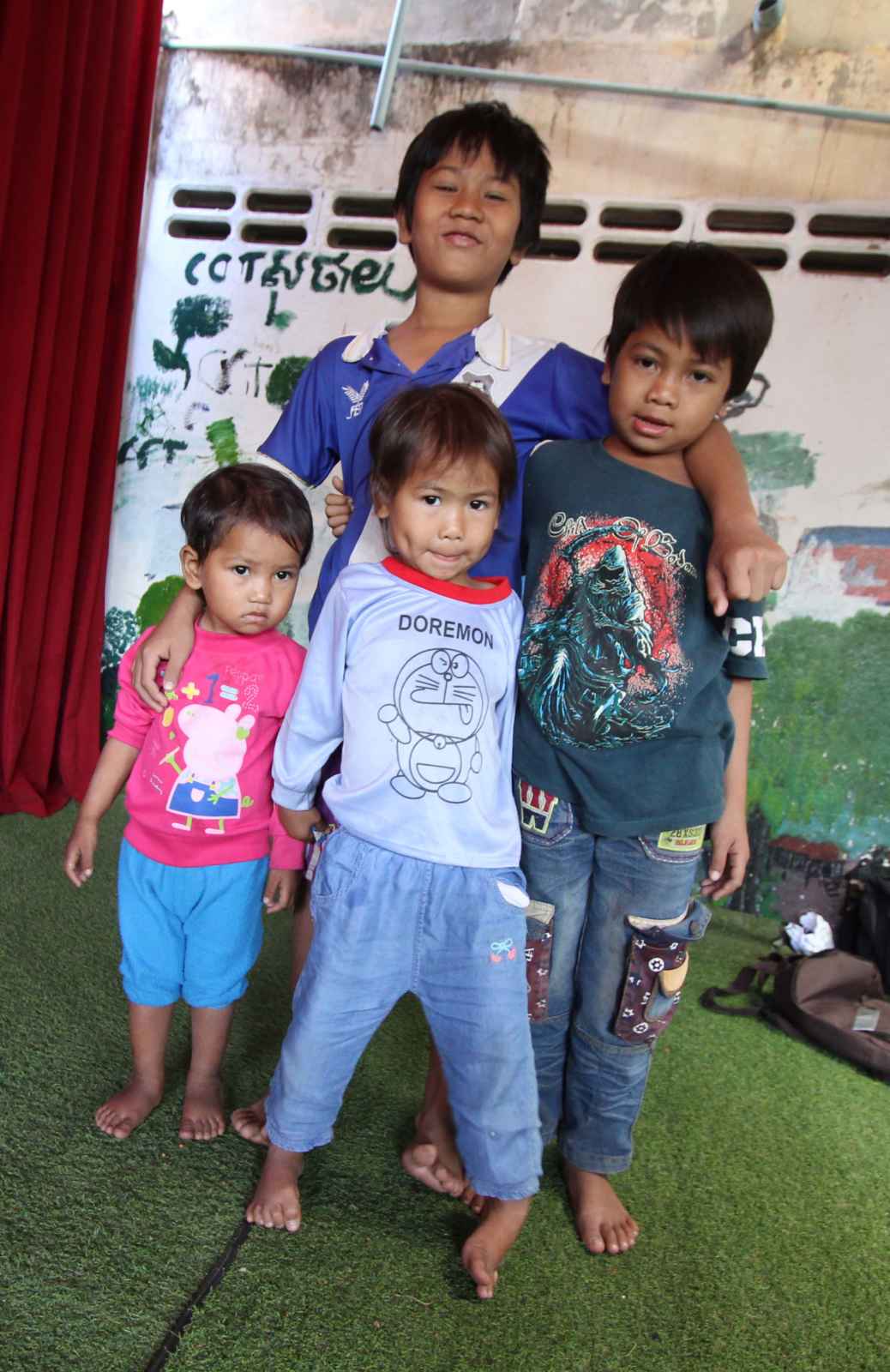
Two months ago, staff from the Commune Council for Women and Children (CCWC) saw a pregnant woman carrying two young girls and begging in the street. They contacted CCT for emergency assistance, and we went to meet the family to deliver food supplies and provide crisis support.
Sareoun is a single mum of four young children, Sith, Vanny, Theara and Thyda. She recently moved to Battambang so she doesn’t have much support here, and she is heavily pregnant with her fifth child. Upon learning about the severity of the family’s situation, the four siblings were quickly enrolled into the Youth Centre.
At the centre they can access all their basic needs, along with healthcare, counselling and public school enrolment support. The two older brothers have started attending public school and the two younger sisters are in CCT’s preschool programs together.
As mum is about to have a baby, she cannot work. Our Medical Outreach team is monitoring Sareoun’s pregnancy and will take her to the hospital when she has her baby. We have just found Sareoun a safe house and will cover the rent and continue to deliver food supplies to ensure the children have food to eat when they get home from the Youth Centre each evening.
Bot and her family live in the middle of the jungle, with no electricity or running water. With recent heavy rainfall and flooding, Bot was unable to work or afford food.
CCT responded to the crisis call with emergency food supplies. A team of CCT social workers, family finance officers and a nurse came to support Bot, and help her identify what she needs to raise her children.
New Vulnerable Families Identified And Referred To Cct Social Workers
Case Plans Co-Created With Families
Cambodians Reached With Awareness Campaigns About The Harms Of Orphanages
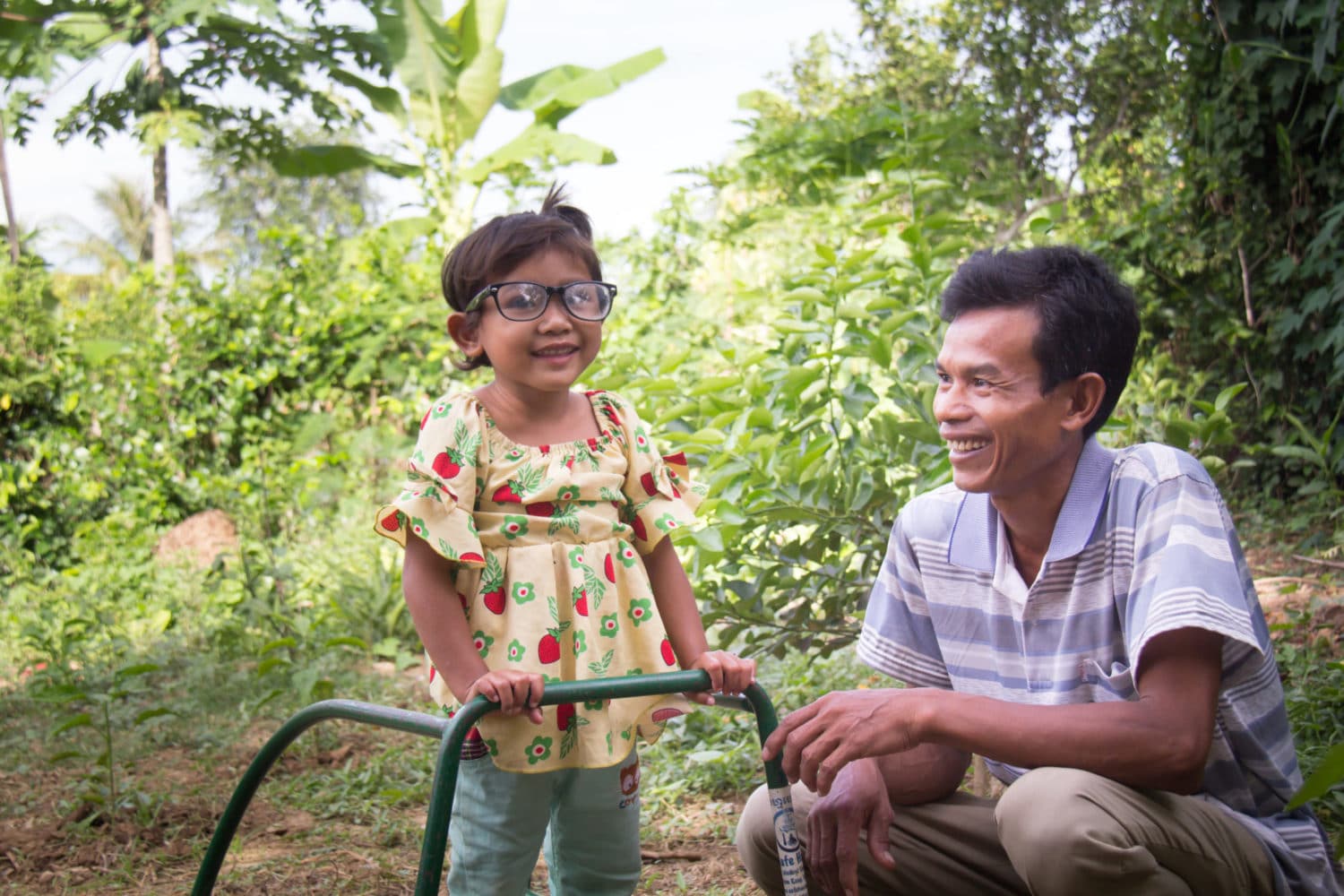
When CCT met Samnang his wife had just passed away and he was struggling to care for his two youngest children, Rysa, 6, and Makara, 7, who both have disabilities.
We helped Samnang to set up a network of trusted friends and neighbours who can help him care for his children and who assist with transportation to hospital. CCT then assisted Samnang to contact his village chief to get birth certificates for his children. CCT’s Medical Outreach team brought Rysa to Safe Haven, a medical outreach program supporting children with disabilities, who provided her with much-needed glasses. We then provided her with a walking frame.
CCT’s Family Finance team has been working closely working with Samnang, teaching him skills that allow him to produce and sell his own vegetables and compost. They’re also teaching Samnang financial literacy skills. Together, they budget the cost of running his business and estimate how much profit he could make, as well as teaching Samnang about business expenses, family expenses and saving for the future.
Rysa and Makara are developing well now they have the healthcare support they need. Supporting Samnang to access these vital public services means the whole family have the support they need to thrive, and stay together.
Patient Visits To Provide People In Vulnerable Families Life-Saving Medical Services
Houses Built And Homes Renovated
Children Reintegrated To Families From Orphanages
Families Who Have Attained Full Independence From CCT’s Support
Families Coached In Financial Literacy And Income Generation
People Supported To Access Government And Private Health Care Facilities For Treatment
Vulnerable Children Provided With Short-Term Alternative Care In Response To A Family Crisis
Children And Youth In Foster Care Who Moved Into A Forever Family
CCT’s Village Hive mobilises whole communities to strengthen families and ensure no vulnerable child is overlooked. In Kammakor Village in Battambang city, 12 extremely vulnerable families were identified. These families are homeless and the only site in their village they have been allowed to set up shelters was on top of the village’s old dumpsite.
Some of the families have been squatting on this site for over a decade, creating untold damage to their physical and emotional wellbeing. The children living in these families weren’t enrolled in school and were suffering serious physical ailments including malnutrition.
CCT’s Village Hive is designed in partnership with the community to respond to cases exactly like this.
The community rallied together to clean up the site. CCT’s construction team worked with the community to remove the rubbish, drain the toxic waste, fill in the site with new dirt. Now construction has begun on new, safe shelters for the families. CCT’s social work and medical team have worked with the families to ensure they have access to all their basic needs. All the children are now enrolled in public school and accessing other vital services such a nutrition, health care and day care services from one of CCT’s Youth Centres.
Watch the video to see the first stage of the transformation.

This is one of the families living at the slum in Kammakor Village. Before CCT started the railway renovation project, Heng, 10, and Khanha, 7, lived on a wooden cart in rubbish, mud and sewage.
Their mum, Thy, collects bottles to support her family, but the kids didn’t have enough food to eat and didn’t go to school. After we started the Kammakor transformation project, a social worker met Thy and brought Heng and Khanha to one of CCT’s Youth Centres so they could access their basic needs. Because the family were in such a vulnerable situation, they stayed overnight in crisis accommodation at the centre for several nights. We made sure they had food, water, blankets and were safe, while we helped to secure safer accommodation.
Heng and Khanha expressed that they wanted to start school so CCT social workers started the process to access their birth certificates. Teachers at the Youth Centre began providing tutoring to prepare them to start at public school. Now they’ve been able to start school, CCT has supplied their school uniforms, bags, shoes and books.
After we finish the Kammakor transformation project, the family will have a small, safe and secure home of their own and we will continue working with the family to make empowerment plans for their future.
CCT social workers conducthygiene workshops with the children living in the Kammakor slum. Some of these children have grown up in this village and have never had access to proper hygiene and sanitation facilities. CCT’s social work and medical team are working with the children, and their families, to teach them good hygiene practices.
For now the children are accessing hygiene and sanitation facilities at one of CCT’s Youth Centres. When the Kammakor slum transformation project is complete, the children and their families will have bathroom and shower facilities at home.
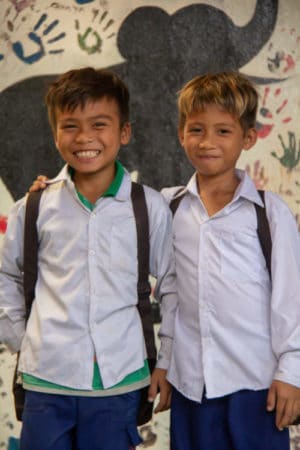
Devid, 9, Daven, 8, and Davy, 5, also live in the slum in Kammakor Village.
Since the Kammakor Transformation project has begun, CCT social workers enrolled the children into one of CCT’s Youth Centres. At the Youth Centre they can access basic needs that they don’t currently have at home, such as clean drinking water, nutritious meals, hygiene and sanitation facilities and access to healthcare.
The older siblings, Devid and Daven, were not going to school when CCT began working with them. Devid had been to school in the past when he lived with his grandma, but his younger brother Daven, who is 8 years old, had never been to school. As soon as the siblings started attending the Youth Centre, a plan was made to get them enrolled into public school, and to enrol Davy into public preschool.
CCT social workers worked with the family’s Village Chief to register for birth certificates so they could enrol in school. While waiting for their birth certificates to arrive, Devid and Daven began tutoring and taking extra classes at the Youth Centre to help prepare them for school.
At the start of December, Devid and Daven started public school. As Devid had been to school before he started in Grade 3, while his brother, Daven, started in Grade 1. Davy wasa enrolled into public preschool. They will continue to attend the Youth Centre in addition to public school and public preschool each day.
After the Kammakor transformation project is finished, the family will have a small, safe and secure home of their own. CCT social workers will continue working with the family to make empowerment plans for their future.
Public School Students In 2019 Enrolled In Ict Course
National Competitions Won By Ict Students
Public School Students Who’ve Completed The Ict Course Since 2015
A team of four female students who study CCT’s ICT program made it to the semi-finals for the Technovation global competition- the world’s largest tech entrepreneurship program for young women.
The competition challenges girls all over the world to identify community problems, build a mobile application to address the problems, and design a business plan to market the app. And out of the 1,900 teams around the world they made the semi-finals!
Their team is called Agent Bring Help and they designed an app, Cheery, that helps people suffering with mental health issues.
ICT Students Competing Nationally And Internationally
‘NINJA’ Students Trained In Advanced Ict Since 2015
New ‘NINJA’ Students Trained In Advanced ICT
Last month, CCT’s ICT students were invited to the 15th Annual STEM Festival in Phnom Penh. At the 2-day festival, they presented their ICT student projects and entered the robot-sumo competition, and they won!
It was their first time being invited to the festival, so to win the competition is such a fantastic achievment. Three of the ICT students who went to Phnom Penh are enrolled in the Youth Centre programs.
There were 5 groups in the robot-sumo competition, two of the groups were CCT’s ICT students from 2 public schools in Battambang. The other three groups came from international/private schools in Phnom Penh.
New Teachers Trained To Deliver The ICT Curriculum At Public Teacher Training College
Public School Teachers Trained To Deliver The ICT Program At Public Schools In Battambang
Teachers Trained To Deliver The ICT Curriculum Since 2015
There are six villages in Ou Char Commune, located in the heart of Battambang City. The CCT Village Hive model has been operating in all six villages since 2017, with CCT teams delivering vital services and running support programs reaching 493 families.
In 2019, a pilot was launched to embed CCT’s Village Hive model into public systems in all six villages in Ou Char Commune.
The pilot will see the management of the Village Hive Model transferred from CCT to the Ou Char Commune where it can be run and managed by the local council, in partnership with the four local public schools and health centre in Ou Char.
The aim of the pilot is to see the Village Hive, which has been co-designed by the community, functioning as the child protection and social protection system for the commune. The knowledge of how to run and operate the Village Hive will live within the community’s public systems that will live on beyond the life of CCT.
The sustainability pilot will see CCT’s Village Hive Model ratified as the commune’s child protection and social protection system, run and managed by the Ou Char local council.
Work has already begun to establish Youth Centres in all the four public schools in the commune.
What: Exit Plan
When we talk about sustainability, we are referring to the aim for our work to live on beyond the life of the organisation. We are working ‘upstream’ solutions to solve the root causes of poverty, family separation and early adversity in childhood. We are working to do ourselves out of a job!
To achieve this, CCT is embedding our unique Village Hive model into public systems such as the local council, schools and medical centres, and collaborating on all aspects of programs with local communities. We are also reducing foreign staff working in Cambodia from current levels of less than one per cent, down to zero within the next three years.
How: True Empowerment
The knowledge of how best to protect children, lives within local communities.
Community empowerment is essential to achieving lasting, sustainable impact. The definition of ‘empower’ is to ‘give power.’ CCT gives communities the power to design their Village Hive and control the implementation and ongoing management.
Our motto is: “Nothing about them without them.” Communities are engaged and have a vested interest in their Village Hive because we co-create every plan throughout every step of the process, from concept to design to implementation. The result is each village has a child protection system that works for their specific community, ensuring no vulnerable child is overlooked.
Why: Systemic change
We believe the role of NGOs should be to solve problems and create systemic change. It seems an obvious statement to make, but in reality NGOs often get so caught up in reacting to problems that their focus and resources are pooled into bandaid solutions. This approach can inadvertently end up fueling the problem and sometimes unintentionally creating new ones.
To solve problems and create systemic change, NGOs often need to take the risks that governments can’t by piloting innovative, community-designed programs. The approach needs to be ‘upstream’ and address the root causes of a problem. When an innovative program has been tried and tested, it should be handed over to be run and controlled by communities and local government. In this way, programs will live on beyond the life of the NGO, in the hands of the community, where it rightly belongs.
CCT has worked for over 12 years to empower Cambodian youth. Many of these youth are now strong, capable and informed young adults. It is crucial that their voices heard at the decision making table.
We’re excited to announce that four ex-beneficiary young adults will join CCT’s advisory board of directors.
Sinet is a screenwriter, voice artist and child rights activist.
SreyNeth is completing her social work degree at the Royal University of Phnom Penh.
Kakada is an entrepreneur running his own business.
Sakhon is completing his degree in international relations at Paragon International University
All four young people all have direct experience with institutional care, foster care, and family preservation. Their views and ideas will be invaluable to informing the ongoing development of CCT’s work.
CCT’s Village Hive model has been developed through a ‘pilot, learn and grow’ approach over 12 years in Cambodia. This approach involves developing a sound qualitative and quantitative evidence-base to support the model. The ongoing evaluation of all aspects of the model informs decisions about the growth and development of the model, ensuring evolution is based on empirical evidence.
We will begin sharing these evaluations with you to gain a deeper insight into the practice that underpins our Village Hive model.
Here is the evaluation of CCT’s social work supervision practice, written by Sophorn Ngath, senior manager of social work and Research & Development.
Supervision is an essential part of reflective practice and an integral part of social work. Supervision provides social workers with the opportunity to evaluate, discuss intentions and develop innovative solutions.
CCT’s Social Workers participate in group, peer and individual supervision.
Summary of Supervision Evaluation: https://cct:8890/wp-content/uploads/2019/11/CCT_Evaluation_SW_Supervision_Summary_Sophorn_Ngath.pdf